
ICAS Bulletin (online ISSN 2836-3418, print ISSN 2836-340X) is published every other week throughout the year at 1919 M St NW, Suite 310, Washington, DC 20036.
The online version of ICAS Bulletin can be found at chinaus-icas.org/bulletins/.
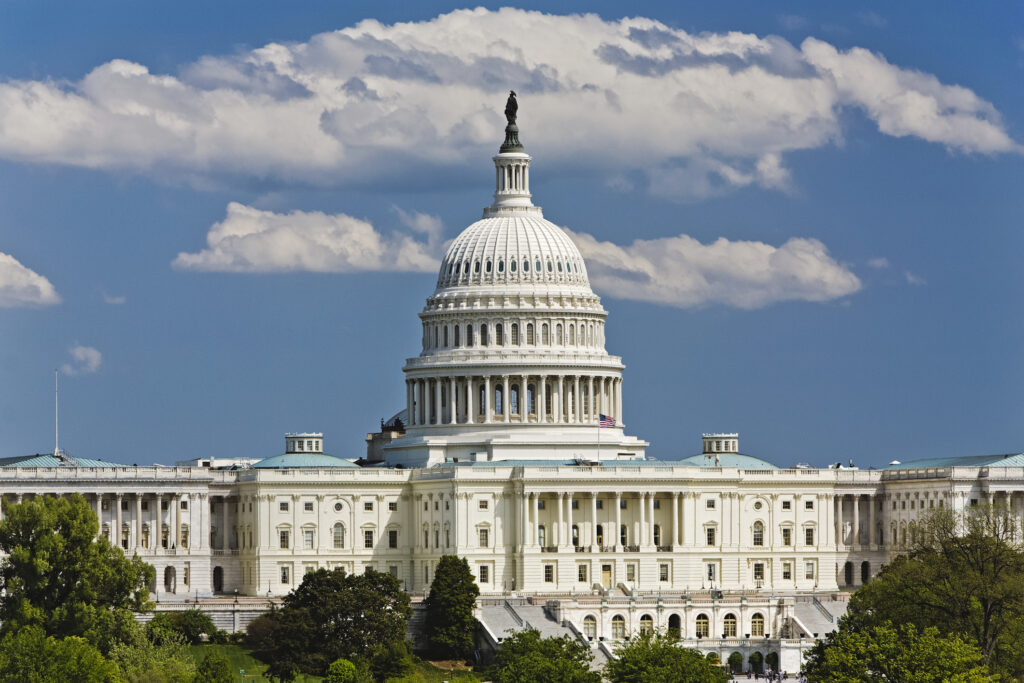
– The Chinese foreign ministry spokesman Wang Wenbin found the recent Biden-Kishida summit not to promote regional peace and stability but rather “full of groundless smears against China.”
– On January 12, a new U.S. carrier strike group began operating in the South China Sea, marking another substantial increase in U.S. presence in the South China Sea.
– The U.S. and Japanese governments convened new initiatives in their strategic cooperation: the U.S. will now protect Japanese satellites, equip Tokyo with long-range missiles, and upgrade U.S. marine forces in the country.
– Japanese newspaper Yomiuri said the U.S. wants to place Marine units throughout the Okinawa islands as early as 2026 as a strategic counter to China’s influence in the region.
– The U.S. House of Representatives set up a new committee to study ways the U.S. can counter China economically and strategically, with House Speaker Kevin McCarthy calling China “the greatest geopolitical threat of our lifetime.”
– U.S. Department of Defense officials have insisted on the importance of building U.S. interlinked warfare systems to counter Chinese Multi-Domain Precision Warfare systems.
– The U.S. has reduced its number of naval transits through the Taiwan Strait during 2022 to the lowest level in four years, despite an increase in Chinese military pressures on the island.
– Despite the decrease in naval transits, the U.S. navy sent a warship through the Taiwan Strait on January 5, striking anger in Chinese military officials as well as the Chinese Embassy in Washington, D.C.
“China’s concerns deepen as US and Japan hail ‘stronger than ever alliance’,” South China Morning Post, January 14 [Paywall]
“US carrier strike group begins operating in South China Sea as tensions with China simmer,” CNN, January 13
“U.S., Japan Expand Security Cooperation With New Steps to Counter China,” The Wall Street Journal, January 11 [Paywall]
“U.S. wants to deploy missile-armed Marines along Japan’s Okinawa islands -Yomiuri,” Reuters, January 10 [Paywall]
“GOP House’s China Panel to Study ‘Greatest Geopolitical Threat’,” Bloomberg, January 10 [Paywall]
“US military urged to act faster on interlinked warfare system as China catches up,” South China Morning Post, January 9 [Paywall]
“US Cuts Taiwan Transits Even as China Steps Up Military Pressure,” Bloomberg, January 6 [Paywall]
“U.S. warship sails through sensitive Taiwan Strait; China angered,” Reuters, January 5 [Paywall]
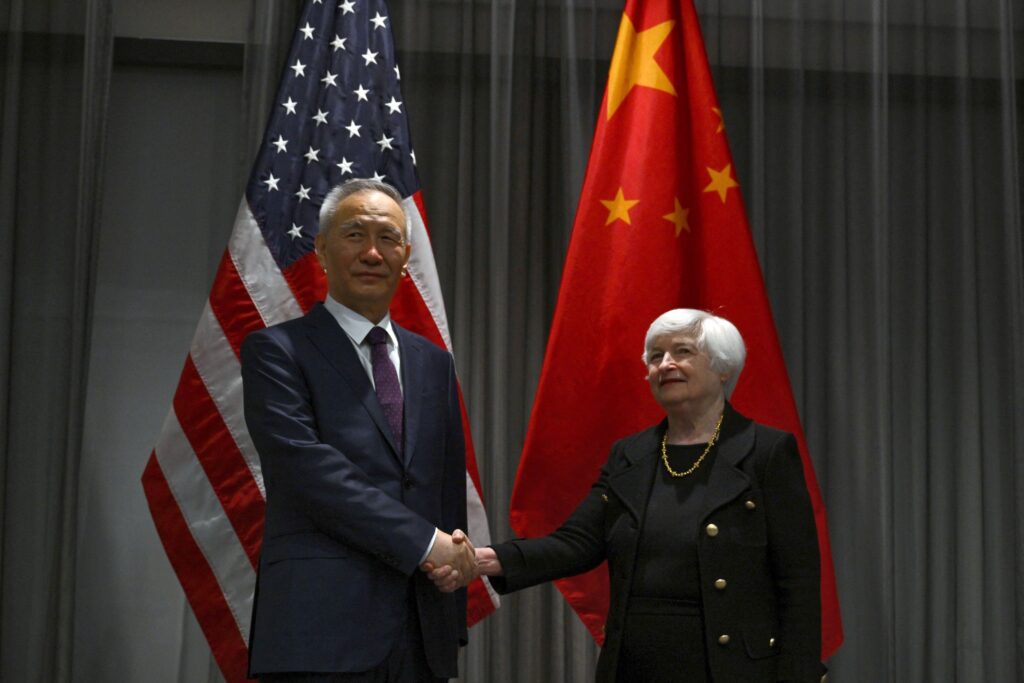
– U.S. Treasury Secretary Janet Yellen will meet Chinese Vice-Premier Liu He for the first time in person in Zurich, Switzerland this week to strengthen macroeconomic and financial policy coordination.
– American containerized imports from China have been eclipsed by the rest of Asia, indicating continuous decoupling and diversification to avoid supply-chain bottlenecks during the post-pandemic era.
– China’s economic growth fell to its second-lowest level in four decades last year under “zero-COVID” controls and a real estate slump, though Goldman Sachs economist Andrew Tilton said the country’s reopening should lead to bursting economic growth in 2023.
– From January 14-17, the second round of talks for the U.S.-Taiwan Initiative on 21st-Century Trade was held in Taiwan, furthering discussion on issues like trade “facilitation,” anti-corruption, small and medium-sized enterprises, and regulatory practices. The talks also hope to help ensure “early-harvest deals” on various traded goods.
– On January 10, Chinese Tesla owners protested at a delivery center in Shanghai after similar protests were held in cities including Henan, Wuxi, and Hangzhou over Tesla’s previous price cuts that they have missed.
– On January 10, Morgan Stanley raised its prediction on China in its economic growth to 5.7%, stock market by 16%, and yuan target to 6.65 to the dollar, as the country rescinded two years of tight COVID-19 controls.
– Public relations specialists from a multinational firm reported a trend of Chinese companies localizing image and operations to restore competitiveness in the U.S. as they try to cope with recent U.S. security policies.
Associated News References:
“China’s Vice-Premier Liu to meet US Treasury Secretary Yellen this week,” South China Morning Post, January 17 [Paywall]
“US importers shipping more to America’s east coast ports than west coast amid global supply chain shifts,” South China Morning Post, January 17 [Paywall]
“China’s Economic Growth Falls to 3%, Gradually Reviving,” Associated Press, January 17
“US, Taiwan ‘exchange views’ during ‘satisfactory’ talks toward landmark trade deal,” South China Morning Post, January 17 [Paywall]
“Protesting Tesla China buyers vow more pressure over price cuts they missed,” Reuters, January 10 [Paywall]
“Morgan Stanley bumps up China growth, stocks and yuan forecasts,” Reuters, January 10 [Paywall]
“Global Chinese firms try ‘decoupling’ from China as US business climate turns hostile,” South China Morning Post, January 5 [Paywall]
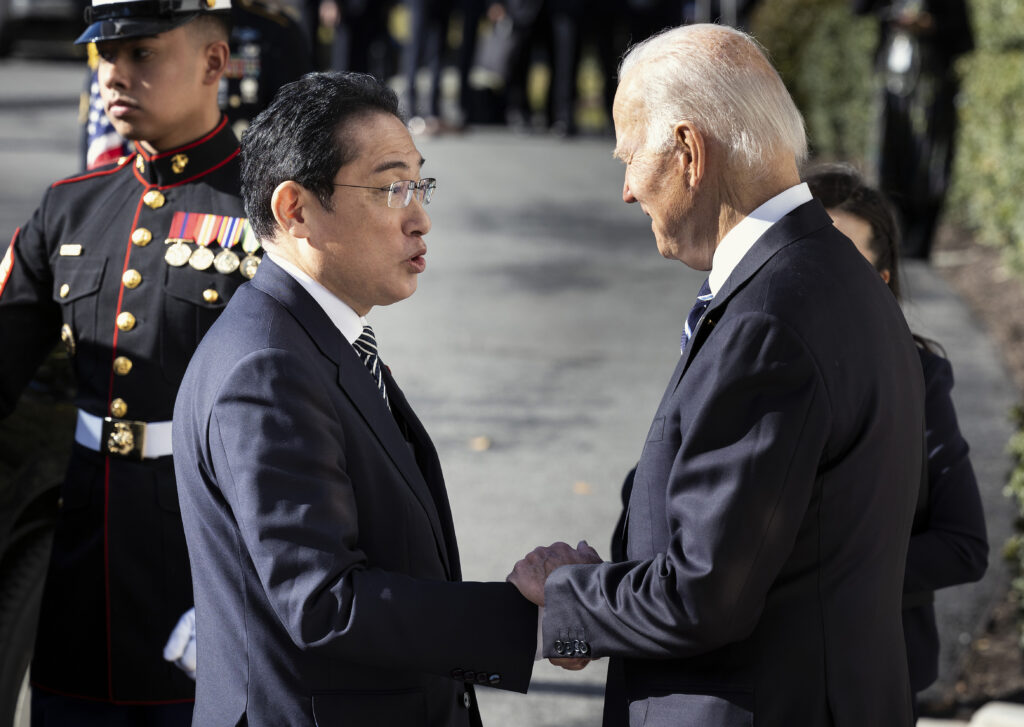
– The U.S. Department of Defense continues to face difficulties in resuming military-to-military talks with China, with the Chinese government turning down U.S. offers to hold military de-escalation talks despite recent coolings in diplomatic meetings, underscoring the long-term tensions between the two countries’ militaries.
– Secretary of State Antony Blinken will meet with Foreign Minister Qin Gang February 5-6 to discuss varying bilateral pressure points, such as Taiwan, trade policy, and Beijing’s human rights record.
– On January 13, U.S. President Biden and Japanese Prime Minister Kishida Fumio vowed to increase cooperation to build up the Japanese military in-efforts to counterbalance China during a visit by Kishida to the White House.
– China looks to nominate Xie Feng, current vice foreign minister, as the new Chinese Ambassador to the U.S. in a move that some regard as a decrease in “Wolf Warrior” diplomatic tactics.
– Chinese chief climate negotiator Xie Zhenghua virtually met with U.S. counterpart John Kerry looking to jointly address challenges of Climate Challenges.
– In a statement, the newly appointed Chinese Foreign Minister Qin Gang said Africa cannot be an arena for international competition.
– Ex-foreign ministry spokesman Zhao Lijian was reassigned as the deputy head of the Department of Boundary and Ocean Affairs, another move in Chinese reversals of “Wolf Warrier” diplomacy strategies.
– The Biden administration plans to reopen the U.S. Embassy in the Solomon Islands to counteract a growing Chinese influence in the Pacific.
Associated News References:
“US-China Defense Talks Stalled Two Months After Biden-Xi Meeting,” Bloomberg, January 17 [Paywall]
“Blinken to test limits of China’s diplomatic engagement on Feb. 5-6 Beijing trip,” Politico, January 16 [Paywall]
“Biden and Kishida Vow to Bolster U.S.-Japan Alliance as China’s Power Grows,” The New York Times, January 13 [Paywall]
“China Likely to Name U.S. Specialist as Next Ambassador to Washington,” The Wall Street Journal, January 11 [Paywall]
“China’s climate envoy Xie meets with U.S. counterpart Kerry,” Reuters, January 12 [Paywall]
“Africa should not be arena for international competition, says Chinese foreign minister,” Reuters, January 11 [Paywall]
“Zhao Lijian: China reassigns combative ‘Wolf Warrior’ diplomat,” BBC News, January 10
“China Snubs US Military Outreach Ahead of Expected Blinken Visit,” Voice of America, January 9
“US moves to reopen Solomon Islands embassy to counter China,” Associated Press, January 4

– Nikkei Asia released a study showing that China is now the champion in artificial intelligence research, finding that China has far surpassed the U.S. in both quantity and quality.
– In the midst of building two new factories in Vietnam, an investment totalling up to US$400 million, Chinese firm and Apple supplier BOE is reportedly looking to help Apple reduce its reliance on Samsung screens as early as 2024.
– Chinese tech giant Tencent Holdings will begin to focus on a new short video platform embedded in the WeChat app looking to compete with rival platforms, such as ByteDance.
– More mainland Chinese manufacturing firms are anticipated to take away Taiwanese firms such as Foxconn and Pegatron.
– U.S. Senators speaking at a Consumer Electronic Show event made statements that technological competition between the U.S. and China is “all about national security” while calling for more investments in emerging industries.
– U.S. computer giant Dell Technologies has made plans to replace all Chinese-made microchips by 2024, citing dramatic increases in tensions between the U.S. and China.
– New U.S. ‘guardrails’ focused on self-reliance within the chip manufacturing sector has begun to be felt by U.S. allies such as South Korea and Taiwan.
Associated News References:
“China trounces U.S. in AI research output and quality,” Nikkei Asia, January 16
“Apple supplier BOE plans new factories in Vietnam,” Reuters, January 10 [Paywall]
“Tencent ramps up bet on short video platform in ByteDance challenge,” Nikkei Asia, January 10
“More mainland Chinese firms will take away market share from Taiwan iPhone suppliers: Investment firm,” CNBC, January 8
“U.S. lawmakers outline next frontiers of China tech competition,” Nikkei Asia, January 7
“Chinese firm BOE poised to help Apple reduce its reliance on rival Samsung’s screens, starting with next iPhone,” South China Morning Post, January 6 [Paywall]
“US computer giant Dell to replace all China-made chips in its products by 2024 amid tensions between Beijing and Washington,” South China Morning Post, January 5 [Paywall]
“US waged war on China’s chips; S Korea, Taiwan felt the fallout,” Al Jazeera, January 5

– Avolon, the world’s second largest jet lessor, has claimed that global air travel will bounce back to pre-pandemic levels by mid-2023, following the Chinese reopening to international travel.
– The Chinese air travel regulator is to allow airlines to fly more routes between the U.S. and China following the lifting of travel restrictions.
– Chinese embassies in South Korea and Japan have stopped issuing new visas to enter China, in retaliation for COVID-19 measures the countries have placed on Chinese travelers.
– New Chinese travel restrictions from the Biden administration on Chinese travelers have caused Asian American advocates to urge caution to travelers over heightened anti-Asian violence.
– The swift abandonment of Chinese COVID-19 restrictions on travel has been met with mixed reactions in the U.S. and China, with many travelers rethinking itineraries based on increases in global COVID-19 cases.
Associated News References:
“Global air travel forecast to bounce back by mid-2023 as China reopens,” Financial Times, January 16 [Paywall]
“China preparing to expand airline service to United States,” Associated Press, January 11
“China halts visas for Japan, South Korea in COVID-19 spat,” Associated Press, January 10
“With new China travel restriction in place, Asian Americans urge nuanced caution,” NBC News, January 9
“As China Lifts Pandemic Border Controls, Mixed Feelings,” The New York Times, January 9 [Paywall]
“U.S. Asks to Drop Case Accusing N.Y.P.D. Officer of Spying for China,” The New York Times, January 16 [Paywall]
“Asian American Democrats jostle for top slot on new GOP China committee,” NBC News, January 12
“Space Launches Should Withstand Chinese Challenge, Pentagon Mandate Says,” The Wall Street Journal, January 10 [Paywall]
“Former US fighter pilot arrested in Australia over China training allegations ‘singled out,’ lawyer says,” CNN, January 10
“Chinese Rocket Launch Boosts Startup’s Bid to Be Nation’s SpaceX,” Bloomberg, January 10 [Paywall]
“Pfizer says locally produced Covid pills may be available in China within the next few months,” South China Morning Post, January 10 [Paywall]
“Pfizer’s Paxlovid not included in China’s national insurance,” Associated Press, January 9
“China in talks with Pfizer for generic COVID drug,” Reuters, January 6 [Paywall]
January 4 hosted by Brookings
January 12 hosted by Center for Strategic and International Studies
January 17 hosted by East-West Center
January 18 hosted by The World Institute of Politics
January 24 hosted by Center for Strategic and International Studies
January 30 hosted by Center for Strategic and International Studies
March 21 hosted by Northwestern University
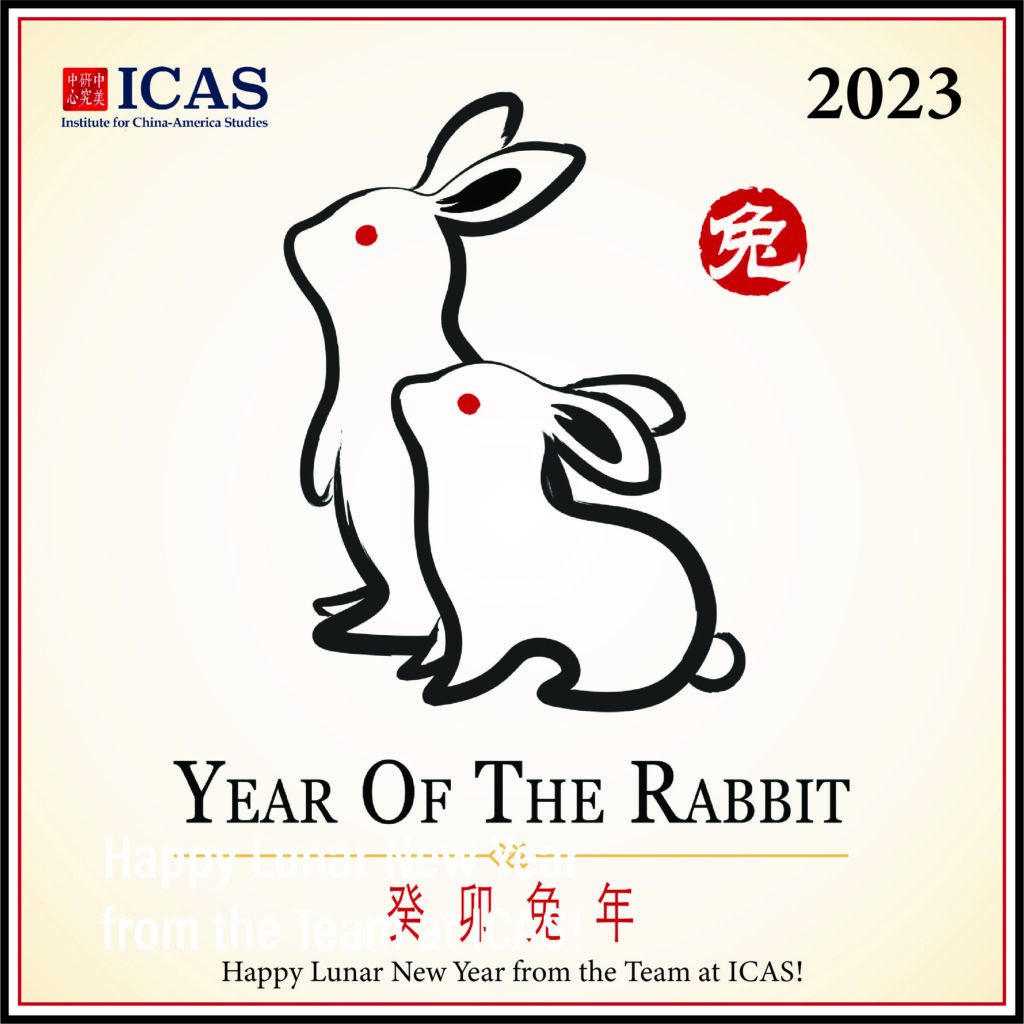
As the world celebrates Lunar New Year in 2023, the Team at ICAS would like to take a moment to express our gratitude for all the support we received in 2022, celebrate a productive year, and spread hope for an engaging and enlightening 2023!
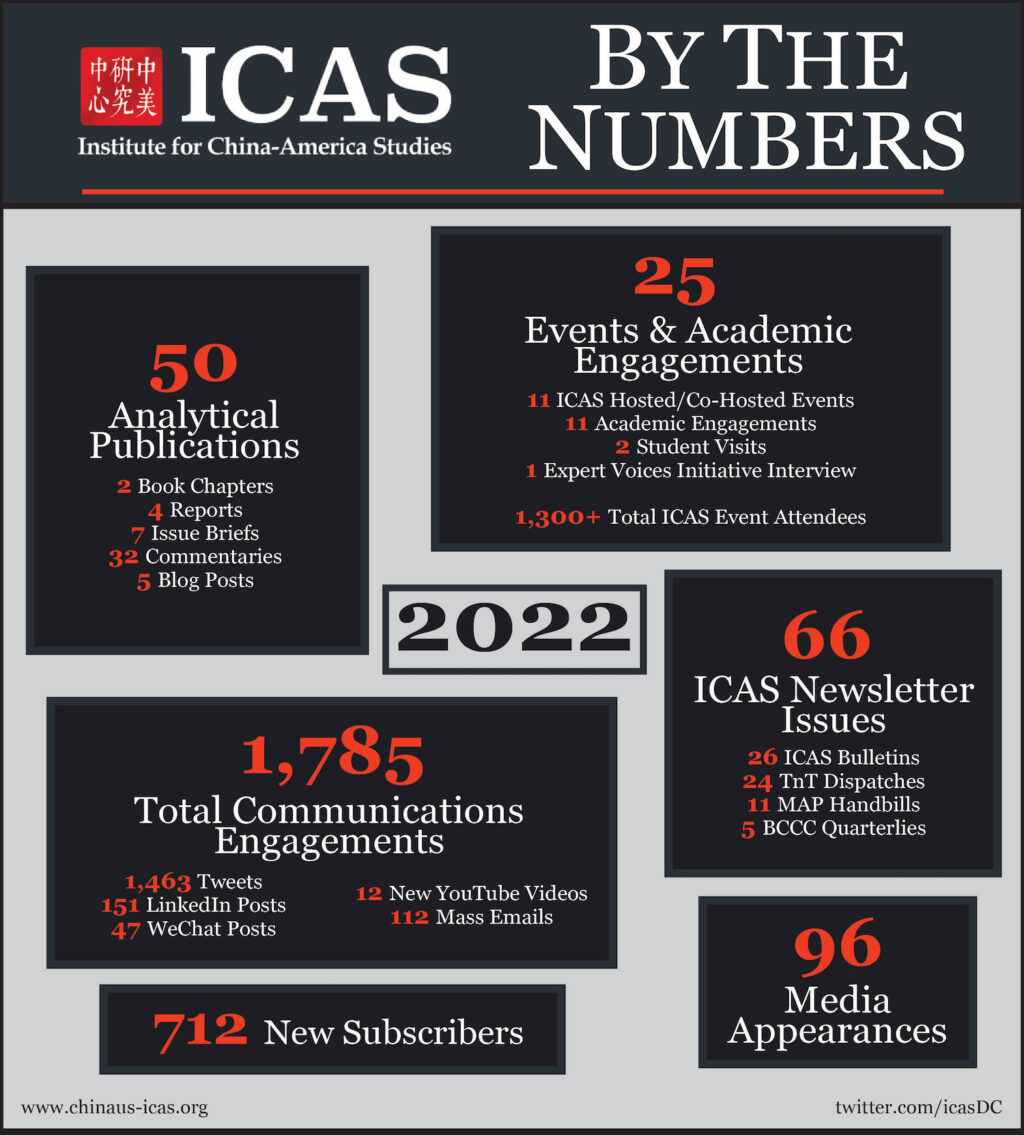
To our readers,
At the turn of 2023, the ICAS Team decided to upgrade our website server to provide better, faster, and more reliable website service to our audience around the world! To fulfill this website upgrade, various technical adjustments were required—both expected and unexpected—which ultimately resulted in our website becoming inaccessible for several days. We apologize for any inconvenience that this outage may have caused or may be causing and are actively working with our provider who has assured us that they will resolve the issue as soon as possible.
We appreciate your continued patience and support with not only this issue but with all of our projects and programs. The ICAS Team could not do what we do without your support and are excited for our improved website performance that will help us better provide a window into the worldviews of both the United States and China, and thereby serve as a vehicle to promote greater understanding between these two countries and societies.
Kind regards,
The ICAS Team
On Friday, January 6, 2022, Senior Fellow Sourabh Gupta was interviewed by CGTN America’s China 24 program to discuss China’s diplomatic goals in 2023.
On Monday, January 2, 2023, Senior Fellow Sourabh Gupta appeared on CGTN America’s The Heat to discuss President Xi’s 2023 New Year address to the Chinese people.

The Institute for China-America Studies is an independent nonprofit, nonpartisan research organization dedicated to strengthening the understanding of U.S.-China relations through expert analysis and practical policy solutions.
1919 M St. NW Suite 310,
Washington, DC 20036
icas@chinaus-icas.org
(202) 968-0595
© 2025 INSTITUTE FOR CHINA-AMERICA STUDIES. ALL RIGHTS RESERVED.